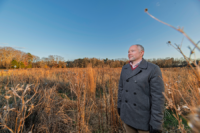Hanover’s Route 33 plan sets up industrial zone
Hanover County’s new Route 33 Gateway Small Area Plan is already attracting the attention of data center developers. Data centers are among the preferred industrial and commercial users under the county’s long-range vision for the U.S. Route 33 corridor between the Henrico County line and Winns Church Road. Hanover‘s board of supervisors adopted the plan […]
Developer says sale of Ashland facility to ICE has been canceled
The sale of a 43-acre site in Hanover County that was set to be purchased by ICE for a detainee processing facility is no longer happening.
Developer withdraws Hanover data center campus proposal
Developer HHHunt withdrew its application for a 10-building data center campus in Hanover County.
Hanover supervisors oppose ICE facility site in statement, but authority is limited
The Hanover County Board of Supervisors issued a statement opposing ICE's plan to purchase and repurpose a warehouse in the county.
ICE eyes massive Hanover warehouse for processing facility
ICE hopes to purchase a more than 552,000-square-foot warehouse in Hanover County and repurpose it into a processing facility.
Arts | Entertainment | Sports 2025: SCHOFIELD, JENNIFER
With 34 years of theme park industry experience, Schofield started her new role on May 31, succeeding Bridgette Bywater as head of the 400-acre amusement park following corporate restructuring. Previously vice president of retail at the Cedar Point amusement park in Ohio, Schofield holds a bachelor’s degree in hospitality and tourism management from Grand Valley […]
Richmond water crises test city, but growth stays strong
Despite two major water outages in 2024, Richmond leaders remain optimistic, citing business growth, regional cooperation and new investment.
Former Tyson Foods plant in Hanover sells for $5M
The former Tysons Food plant in Hanover County sold for $5 million.
Kings Dominion has new manager after Six Flags layoffs
Jennifer Schofield succeeds Bridgette Bywater as Kings Dominion’s head, following Six Flags announcing a more than 10% full-time workforce reduction.
Randolph-Macon College names next president
Ashland’s Randolph-Macon College has chosen Michael E. Hill as its 16th president, effective Aug. 1, the college announced Tuesday. Hill is currently president of Chautauqua Institution, a western New York nonprofit educational institution for children and adults that runs extensive theater, music and other arts programming during its nine-week summer season. He will succeed Randolph-Macon [[...]
The Virginia Home plans $128M campus in Hanover
The Virginia Home plans to build a $128 million, 75-acre campus in Hanover County, according to a Thursday announcement by the nonprofit, which serves adults with irreversible physical disabilities. The current facility in Richmond will be sold, a spokesperson said. At its location overlooking Richmond’s Byrd Park, The Virginia Home houses 130 residents who have […]
Richmond starts water testing, but city remains under boil water advisory
On Thursday, Richmond Mayor Danny Avula said that water levels have risen across the city to the point that authorities have started testing samples for contamination and most buildings in the city have at least some running water, four days after the city’s water treatment plant failed following a winter storm. A Jan. 6 power […]





















